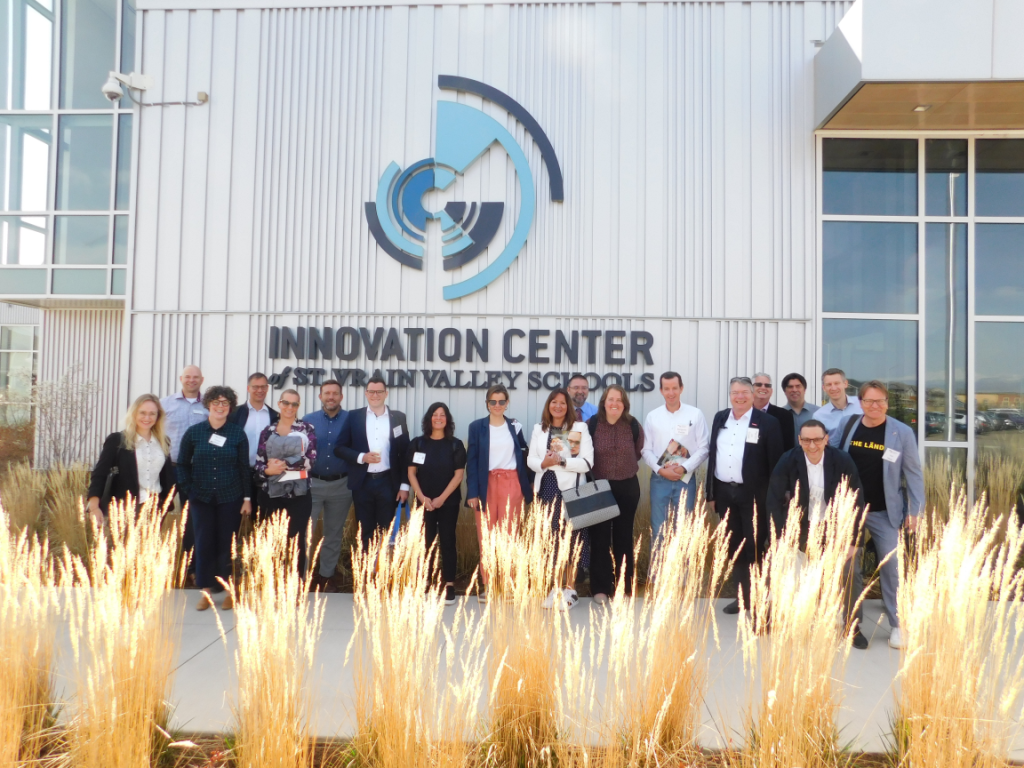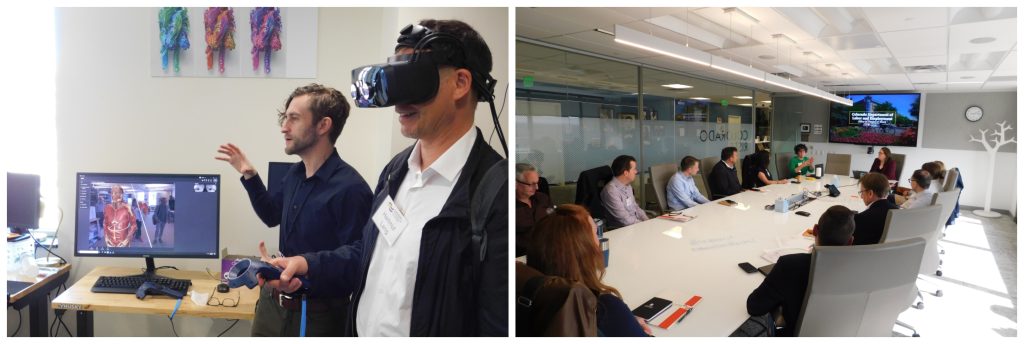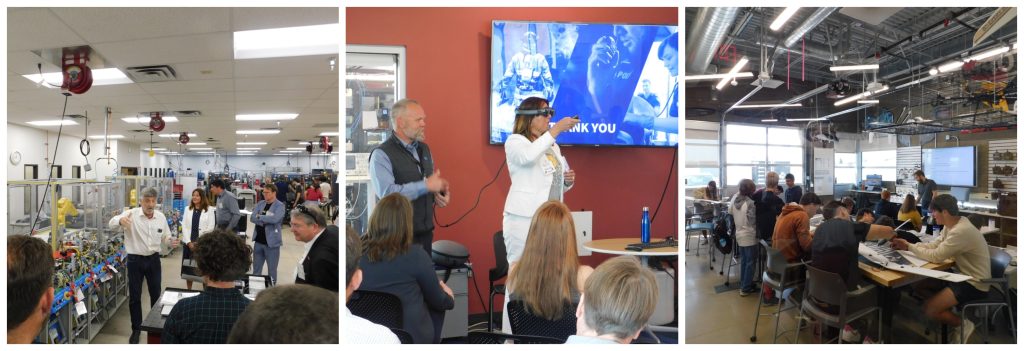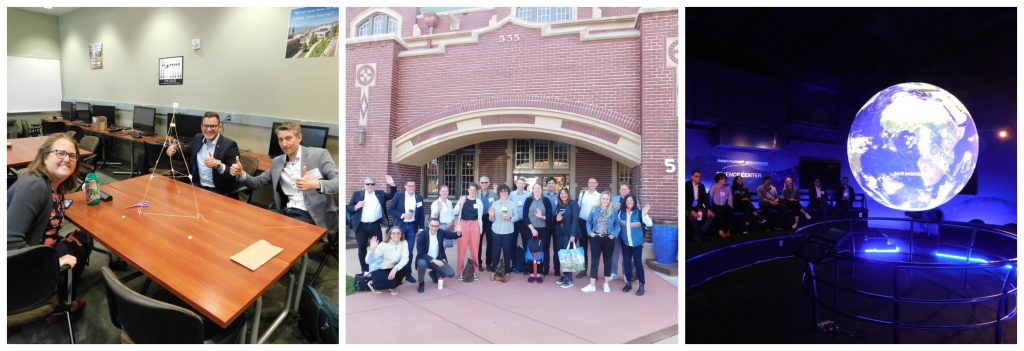 After a two-year hiatus due to the pandemic, from April 24 to April 30, 2022, the American Council on Germany implemented the third round of exchanges for its Transatlantic Cities of Tomorrow: Digitalization and the Future of Work initiative, a reciprocal exchange program for thought-leaders in small- and medium-sized cities in Germany and the U.S. to develop solutions to common challenges resulting from digitalization and to identify innovative approaches to turning these challenges into opportunities for their local workforce and economies.
After a two-year hiatus due to the pandemic, from April 24 to April 30, 2022, the American Council on Germany implemented the third round of exchanges for its Transatlantic Cities of Tomorrow: Digitalization and the Future of Work initiative, a reciprocal exchange program for thought-leaders in small- and medium-sized cities in Germany and the U.S. to develop solutions to common challenges resulting from digitalization and to identify innovative approaches to turning these challenges into opportunities for their local workforce and economies.
The 20-person delegation included education and workforce development administrators, entrepreneurs and innovation experts, representatives from economic development agencies, municipal associations, and city and state governments from the regions of Heidelberg, Mainz, and Stuttgart in Germany and the cities of Boulder, Colorado Springs, and Denver in the United States.
Beginning in Denver, the delegation learned about innovation and digitalization in healthcare with a visit to the University of Colorado Anschutz Medical Campus as well as its Inworks Innovation Initiative demonstrating how advances in virtual reality and 3-D printing are transforming medical care. Meetings with Comal Heritage Food Incubator, Mi Casa Resource Center, and the Markle Foundation’s Rework America Alliance shared successful efforts to support women, immigrants, and other groups with skills-based training and career matching as opposed to traditional credential-based training and hiring. A session with the Colorado Office of the Future of Work and the Colorado Department of Higher Education’s Collegiate Apprenticeship Program highlighted the state’s efforts to promote and enhance apprenticeship programs to help fill the state’s job shortages. Representatives from the Denver Office of Economic Development and Opportunity provided an overview of the many city initiatives striving to build a sustainable economy focused on digital equity, expanding infrastructure – both physical and wrap-around services like the care sector and education, economic development programs for BIPOC, and efforts to create an ecosystem of innovation and entrepreneurship. A meeting with the Colorado Smart Cities Alliance and Denver Smart City shared the ways cities in Colorado are using innovation and technology to solve challenges and enhance the quality of life. And a workshop with Integrated Work shared lessons about leading virtually, peer learning, and collaboration in a virtual world.
 The highlight of the visit to Boulder/Longmont was a tour of the St. Vrain Valley Schools Innovation Center which is rethinking education and providing transformative learning focused on experiential opportunities and innovation. At the Front Range Community College – Center for Integrated Manufacturing, the delegation saw a state-of-the-art training center providing industry-focused education and hands-on training for modern-day manufacturing workers. The session at Workforce Boulder County provided an overview of the workforce development services provided by government agencies in the state, which was then complemented by a meeting with the Boulder Chamber and its efforts to build collaborative community-wide partnerships to define Boulder’s workforce needs. The University of Colorado Boulder – Office of Digital Education shared the university’s efforts to support online learning, faculty development, and the implementation of technology. And at NIST Boulder Laboratories, the group saw some amazing new technology for public safety communication, additive manufacturing, and biomagnetic imaging.
The highlight of the visit to Boulder/Longmont was a tour of the St. Vrain Valley Schools Innovation Center which is rethinking education and providing transformative learning focused on experiential opportunities and innovation. At the Front Range Community College – Center for Integrated Manufacturing, the delegation saw a state-of-the-art training center providing industry-focused education and hands-on training for modern-day manufacturing workers. The session at Workforce Boulder County provided an overview of the workforce development services provided by government agencies in the state, which was then complemented by a meeting with the Boulder Chamber and its efforts to build collaborative community-wide partnerships to define Boulder’s workforce needs. The University of Colorado Boulder – Office of Digital Education shared the university’s efforts to support online learning, faculty development, and the implementation of technology. And at NIST Boulder Laboratories, the group saw some amazing new technology for public safety communication, additive manufacturing, and biomagnetic imaging.
 The delegation concluded the week in Colorado Springs. At the University of Colorado – Colorado Springs, the group took part in an interactive workshop with the team from the UCCS – Bachelor of Innovation Program to learn how innovation can be taught across academic disciplines. The City of Colorado Springs – Office of Innovation shared the many projects the city has undertaken to utilize new technologies to improve city services and ensure a sustainable future for the city. The group toured the Catalyst Campus for Technology and Innovation and learned about its efforts to build collaboration between industry, small business, workforce training, entrepreneurs, startups and venture capital to create community, spark innovation, and stimulate business growth in the aerospace and defense industry. The Space Foundation – Center for Innovation and Education highlighted hands-on learning and cutting-edge technology to teach science to people of all ages. And finishing up the trip, representatives from the Pikes Peak Workforce Center and other local agencies shared efforts to support local workforce training and economic development.
The delegation concluded the week in Colorado Springs. At the University of Colorado – Colorado Springs, the group took part in an interactive workshop with the team from the UCCS – Bachelor of Innovation Program to learn how innovation can be taught across academic disciplines. The City of Colorado Springs – Office of Innovation shared the many projects the city has undertaken to utilize new technologies to improve city services and ensure a sustainable future for the city. The group toured the Catalyst Campus for Technology and Innovation and learned about its efforts to build collaboration between industry, small business, workforce training, entrepreneurs, startups and venture capital to create community, spark innovation, and stimulate business growth in the aerospace and defense industry. The Space Foundation – Center for Innovation and Education highlighted hands-on learning and cutting-edge technology to teach science to people of all ages. And finishing up the trip, representatives from the Pikes Peak Workforce Center and other local agencies shared efforts to support local workforce training and economic development.
 During the week, both the Germans and Americans noted the commitment of every organization to diversity, equity, and inclusion in all of their activities. The Germans also were impressed by the American focus on innovation and the willingness to experiment with new approaches and strategies, highlighted by a comment made by the director of the St. Vrain Valley Schools Innovation Center who said, “We don’t say no, we ask how.” All the participants see a strong need for more apprenticeship-style training as well as a greater focus on skills-based education and credentialing to better match people with the many jobs needing to be filled by business and industry. During the final week of June, the delegation will convene again for a week-long reciprocal visit to Heidelberg, Mainz, and Stuttgart.
During the week, both the Germans and Americans noted the commitment of every organization to diversity, equity, and inclusion in all of their activities. The Germans also were impressed by the American focus on innovation and the willingness to experiment with new approaches and strategies, highlighted by a comment made by the director of the St. Vrain Valley Schools Innovation Center who said, “We don’t say no, we ask how.” All the participants see a strong need for more apprenticeship-style training as well as a greater focus on skills-based education and credentialing to better match people with the many jobs needing to be filled by business and industry. During the final week of June, the delegation will convene again for a week-long reciprocal visit to Heidelberg, Mainz, and Stuttgart.
Transatlantic Cities of Tomorrow: Digitalization and the Future of Work is organized and administered by the American Council on Germany with generous support from the Transatlantic Program of the Government of the Federal Republic of Germany through funds of the European Recovery Program (ERP) of the Federal Ministry of Economics and Energy (BMWi).


